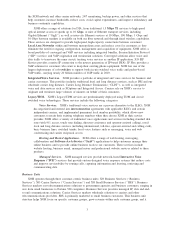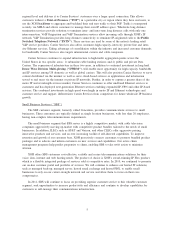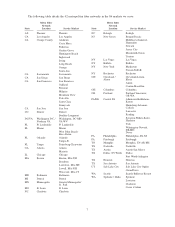XO Communications 2010 Annual Report Download - page 17
Download and view the complete annual report
Please find page 17 of the 2010 XO Communications annual report below. You can navigate through the pages in the report by either clicking on the pages listed below, or by using the keyword search tool below to find specific information within the annual report.State and Local Regulation
Most state regulatory commissions require companies that wish to provide intrastate common carrier
services to register or seek certification to provide these services. These certifications generally require a
showing that the carrier has adequate financial, managerial and technical resources to offer the proposed
services in a manner consistent with the public interest. We are certified in all of the states in which we
conduct business. In most states, we are also required to file tariffs setting forth the terms, conditions and
prices for services that are classified as intrastate, and to update or amend our tariffs as rates change or new
services are added. We may also be subject to various reporting and record-keeping requirements.
In some municipalities, where we choose to deploy our own POPs, we may be required to obtain street
opening and construction permits, permission to use rights-of-way, zoning variances and other approvals from
municipal authorities. We also may be required to obtain a franchise to place facilities in public rights-of-way.
In some areas, we may be required to pay license or franchise fees for these approvals. We cannot provide
assurances that fees will remain at current levels, or that our competitors will face the same expenses,
although the Telecom Act requires that any fees charged by municipalities be reasonable and
non-discriminatory among telecommunications carriers.
Wireless Services Affected by State Regulations. While we anticipate that the dedicated wireless
communications links that XOH currently provides and expects to provide will be used by our customers as
part of their interstate mobile wireless communications networks, we market point-to-point wireless services
designed to carry a customer’s telecommunications traffic from a customer’s facility to the facilities of a
telecommunications carrier or to another of the customer’s offices, primarily within one state. To the extent
necessary, XOH has applied for and anticipates that it will receive and maintain Certificates of Public
Convenience and Necessity, file tariffs and reports, and fulfill other administrative and financial obligations,
such as state universal service fund obligations, as appropriate relative to its services. XOH has received
certificates from 28 state commissions.
Additional State and Local Regulation
Qwest Complaints Against XO. On June 24, 2008, Qwest Communications Corporation (‘‘QCC’’) filed
a formal complaint against XO Communications Services, LLC (‘‘XOCS’’) and numerous other
telecommunications providers before the Public Utilities Commission of the State of Colorado. On August 1,
2008, QCC filed a formal complaint against XOCS and numerous other telecommunications providers before
the Public Utilities Commission for the State of California. On July 2, 2009, QCC filed a formal complaint
against XOCS and numerous other telecommunications providers before the Public Service Commission for
the State of New York. On December 11, 2009, QCC filed a formal complaint against XOCS and numerous
other telecommunications providers before the Public Service Commission of the State of Florida. In the
complaints, QCC claimed that XOCS and the other telecommunications providers violated state statutes and
regulations and, in certain cases the provider’s respective tariffs, subjecting QCC to unjust and unreasonable
rate discrimination in connection with the provision of intrastate access services. On August 1, 2008,
September 22, 2008, August 27, 2009 and January 29, 2010, XOCS filed its answers to the Colorado,
California, New York and Florida complaints, respectively, denying QCC’s claims and setting forth affirmative
defenses. On August 1, 2010 the California Public Utilities Commission issued a decision dismissing Qwest’s
complaint against XO and numerous other telecommunications providers. On September 1, 2010 Qwest filed a
petition for rehearing of the decision. On September 16, 2010, XO and the other defendants responded to
Qwest’s petition for rehearing in California. On November 16, 2010, Access Point, Inc., Lightyear Network
Solutions, LLC, Navigator Telecommunications, LLC, PAETEC Communications, Inc., and US LEC of
Florida, LLC filed a joint motion to dismiss Qwest’s complaint pending before the Florida Public Service
Commission, and on February 22, 2011, the Florida Commission denied the motion. On February 23, 2011, an
Administrative Law Judge issued a recommended decision partially dismissing and partially granting Qwest’s
complaint pending before the Colorado Public Utilities Commission. The likely outcomes of the proceedings
pending before the commissions in Colorado, California, New York and Florida are not known at this time.
13
























